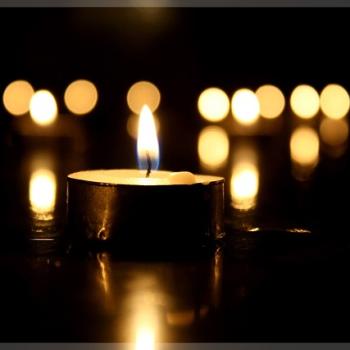Rosh Hashanah, the Jewish New Year, features a liturgy of punishment, judgment and sin that is foreign to me. The holiday's liturgy calls forth an ancient, almost mythological King God. Kingship is a dominant theme of the holiday. Even if I replace God-the-King with God-the-Queen, the liturgy still sings praises to a dictatorship of the divine. However, the Nitzavim portion, which is read in Elul, the Hebrew month preceding Rosh Hashanah, brings with it a glimmer of movement away from the dictatorship of the divine, to a conversation about sin, where I can say, "God, I'm sorry you feel that way, but I beg to differ."
In Nitzvim, immediately after the Jews are commanded to repent and are told to "return to your God with all your heart, and all your soul," the following passage appears
For this commandment that I command you today—it is not hidden from you and it is not distant. It is not in heaven, for you to say, "Who can ascend to the heaven for us and take it for us, so that we can listen to it and perform it?" Nor is it across the sea, for you to say, "Who can cross to the other side of the sea for us and take it for us, so that we can listen to it and perform it?" Rather, the matter is very near to you—in your mouth and in your heart—to perform it. (Duet. 30:11-14)
There is a disagreement among traditional commentators as to what "this commandment" refers to. According to the medieval Jewish philosopher Maimonides, "this commandment" refers exclusively to repentance or return to God. Rashi, a contemporary of Maimonides, disagrees and argues that "this commandment" refers to the entire Torah. Rashi's answer encompasses Maimonides' and his own and suggests that repentance does not exist independently of the Torah itself. To repent, one has to know the laws that were broken. If not in heaven or across the sea, then where can the laws be found?
The Talmud, when interpreting "not in heaven," answers this question through a story of the heavenly voice that comes to earth to settle a minuet legal debate:
Rabbi Eliezer employed every imaginable argument for the proposition that a particular type of oven was not susceptible to ritual impurity, but the Sages did not accept his arguments. Then Rabbi Eliezer told the Sages, "If the law agrees with me, then let this carob tree prove it," and the carob tree moved 100 cubits (and others say 400 cubits) out of its place. But the Sages said that no proof can be brought from a carob tree. Then Rabbi Eliezer told the Sages, "If the halachah agrees with me, let this stream of water prove it," and the stream of water flowed backwards. But the Sages said that no proof can be brought from a stream of water. Then Rabbi Eliezer told the Sages, "If the halachah agrees with me, let the walls of this house of study prove it," and the walls leaned over as if to fall. But Rabbi Joshua rebuked the walls, telling them not to interfere with scholars engaged in a halachic dispute. In honor of Rabbi Joshua, the walls did not fall, but in honor of Rabbi Eliezer, the walls did not stand upright, either. Then Rabbi Eliezer told the Sages, "If the halachah agrees with me, let Heaven prove it," and a Heavenly Voice cried out: "Why do you dispute with Rabbi Eliezer, for in all matters the halachah agrees with him!" But Rabbi Joshua rose and exclaimed in the words of Deuteronomy 30:12: "It is not in heaven." Rabbi Jeremiah explained that God had given the Torah at Mount Sinai; Jews pay no attention to Heavenly Voices, for God wrote in Exodus 23:2: "After the majority must one incline." (Babylonian Talmud Bava Metzia 59b)
"Not in heaven," in this Talmudic narrative, is understood to mean that law is within human authority. The dictatorship of the divine surrenders to the rule of the majority. Here, the tradition embraces its own inevitable humanity, filled with strife and disagreement, but also with potential for collaboration. The law does not go with God, but with the earthly community of lawmakers, who are the guardians, creators and interpreters of everyday governance.
Natzavim is one of the last three weekly portions in the Torah; the Torah is coming to an end, and, like a beloved elder, the text bequests itself to the reader. Here, it's all yours. Love, the Torah.
Repentance, then, is about these earthly laws—the laws of my own doing. It is to my laws that I shall return with all my heart and all my soul. As Rabbi Eliezar learned, inspiration is not in heaven or across the sea—it is where I am now, arguing about the minutia of the kosher status of clay ovens.
9/20/2011 4:00:00 AM





